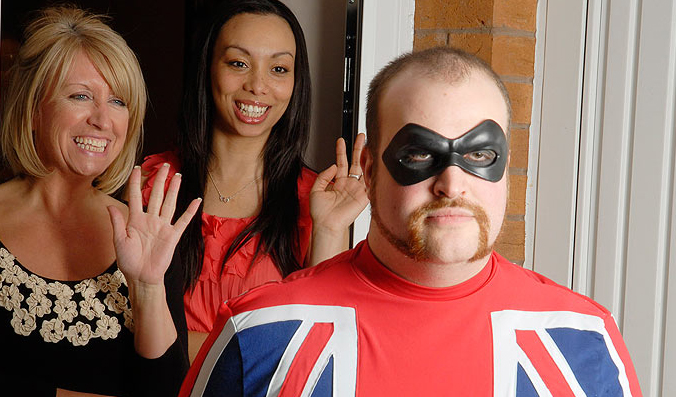 Photo essay originally published online at Hemispheric Institute of Performance and Politics at New York University
Photo essay originally published online at Hemispheric Institute of Performance and Politics at New York University
This photo essay is about Superbarrio Gomez and his journey in the construction of a “politics of the possible” (1) , an alternative political imaginary constituted via popular culture and the construction of a national and transnational social movement. Superbarrio makes evident the collapse between politics and performance; he forces us to think beyond the performance of politics in order to understand the politics of performance. Superbarrio belongs to both the majoritarian class and to the wrestling ring of popular culture, which makes his politics possible. Superbarrio’s practices of popular culture creates a political imaginary in which winning was possible in spite of corrupt referees. But Superbarrio makes evident how the wrestling ring teaches us about political culture as well as social mobilization. Superbarrio’s wrestling ring is a place of possibilities where corrupt landlords and politicians are unmasked .As long as Superbarrio keeps his mask, we all win. Superbarrio’s journey maps an alternative political imaginary that functioned at the local, national and transnational/hemispheric register. At the local level, Superbarrio, with the strength of Mexico City’s Neighborhood Assembly [Asamblea de Barrios] created a social movement that understood that to win one’s home, one had to win at the national level, the National Palace and la Casa de los Pinos [presidential house]. Superbarrio became the symbol to mobilize the political imaginary in which to vote, (against seven decades of perfect dictatorship) was the only option to own the Presidential house. In 1988, Superbarrio aligned forces with Cuauhtemoc Cardenas in the winning of the national vote and they won.
But against systemic corruption, to win was not enough and the social movement had to reach beyond the US/Mexican border. In order to do so, Superbarrio made his first US tour promoting the possibility of Mexicans, living on the US side of the border, to vote for Mexican president. After all, their income has contributed to the Mexican economy 13 thousand million dollars in economic gross. Superbarrio promoted a political imaginary in which voting– a fundamental right of citizenship– could be exercised across national borders. But this transnational campaign was the practice of a political vision that understood the rules of the game within the then nascent process of globalization and the privatization of the Nation-State. In 1994, NAFTA (North American Free-Trade Agreement) would become the national precedent. Knowing the dirty rules of what became a macro-economic political game, Superbarrio jumped out of the national arena to fight for the rights of workers transnationally; he ran for US president in 1996. Superbarrio’s strategy was to contextualize the concept of national citizenship (exercised in the voting of national citizens such as Latinos/as and Latin Americans living in the US with dual citizenship) into that of free trade, not of goods but of people. In his campaign he proposed “free citizenship”, a concept that assumes rights to decent housing and working conditions across nations for all, citizens and non-citizens, the workers of the hemisphere within and beyond the US territory. Superbarrio’s free citizenship becomes a model of global citizenship in which fair housing and fair working conditions function within the realm of human rights transnationally. He also proposed the voting rights of these transnational workers, their vote would count for Mexican as well as US president. Superbarrio’s US presidential campaign, and his premonitory “politics of the possible”, produce an alternative political, social and cultural imaginary. By implication, to believe in Superbarrio is to believe in a collective struggle that functions regionally and operates as a social movement across borders. To believe in Superbarrio is to believe in us as transnational social agents. Beneath the mask, we are all Superbarrio.
(1) I am borrowing this concept from Kumkum Sangari “The Politics of the Possible,” Cultural Critique 7 (Fall 1987: 157-186).

Superbarrio’s performativity, his embodiment of popular strength and collective self, is only possible through his direct participation within the imaginary and memory of popular culture.
The fence from the U.S. to Mexico is recycled and settled in the Palestinian territories. The U.S./Mexican border becomes Wall-Mart Nation, where peso salaries purchase dollar products. Wall-Mart becomes the contact zone, the bridge where socialization takes place via consumption, and transculturation functions by way of gastronomic hybridity with post-national and post-natural products. The category of migrant and/or undocumented worker disappears, now replaced by the Wal-Mart migrant shopper. Wal-Mart becomes a brand citizenship. Mexican workers are from both sides of Wal-Mart as the U.S. becomes Mexico and the south of Mexico becomes the place where the corporate oligarchs live in their natural resorts of Puerto Vallarta, Cancun and Acapulco. Wal-Mart workers are mostly women; child labor laws have been dismantled, given the population’s gastronomic diet made of intense hormonal doses in super-size meals. Workers overdeveloped in size and Mexican mothers conspire by creating cilantro pills to sustain the IQ levels and cultural memory of their overgrown children. Workers sneak in the pills. Reports from the information guerrilla network attest that those who intervene against the Wal-Mart production line risk being devoured into the fast food menu. In the south, the formation of a Coca-Cola State becomes a preventive model against military occupation and tamales are assimilated into Wal-Mart’s production line. The Chinese, out of earthly space, transport their maquila sweat shops into outer space in Bangladeshi man-made space ships. Meanwhile, the electoral process experiences radical change, voting acquires a Wal-Mart redirecting points system; the more one purchases, the more points for the ruling BWW Party. In Wal-Mart World, former U.S. citizens and radicals vote a la the Mexican “si no?”
vote against the ruling party even if it is not in favor of any candidate. Chiapas is yet to be conquered.


